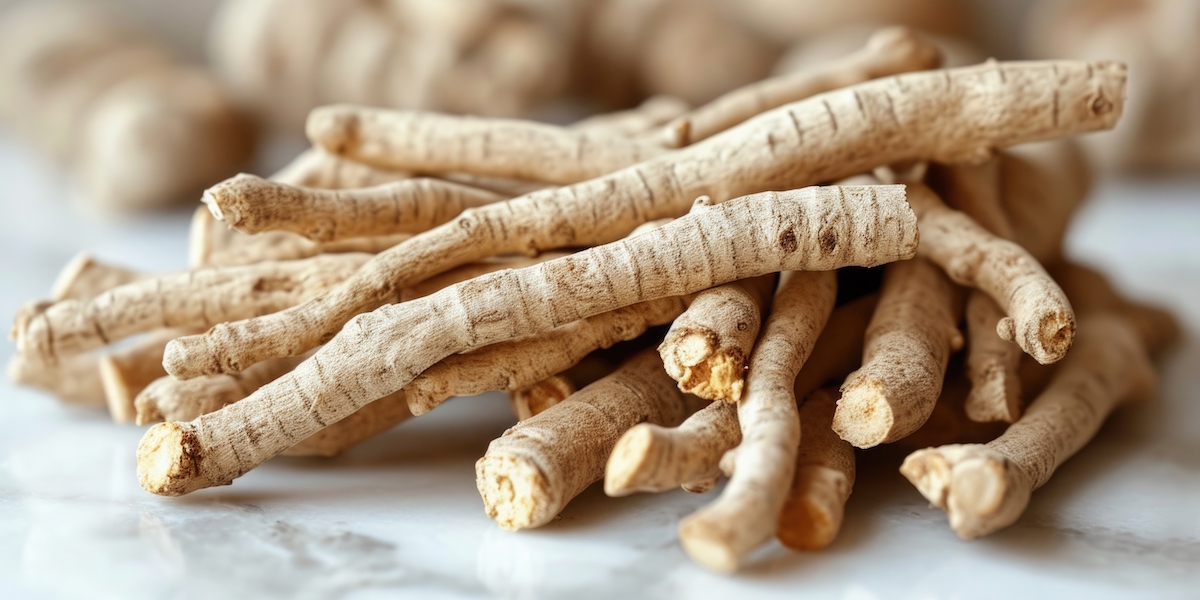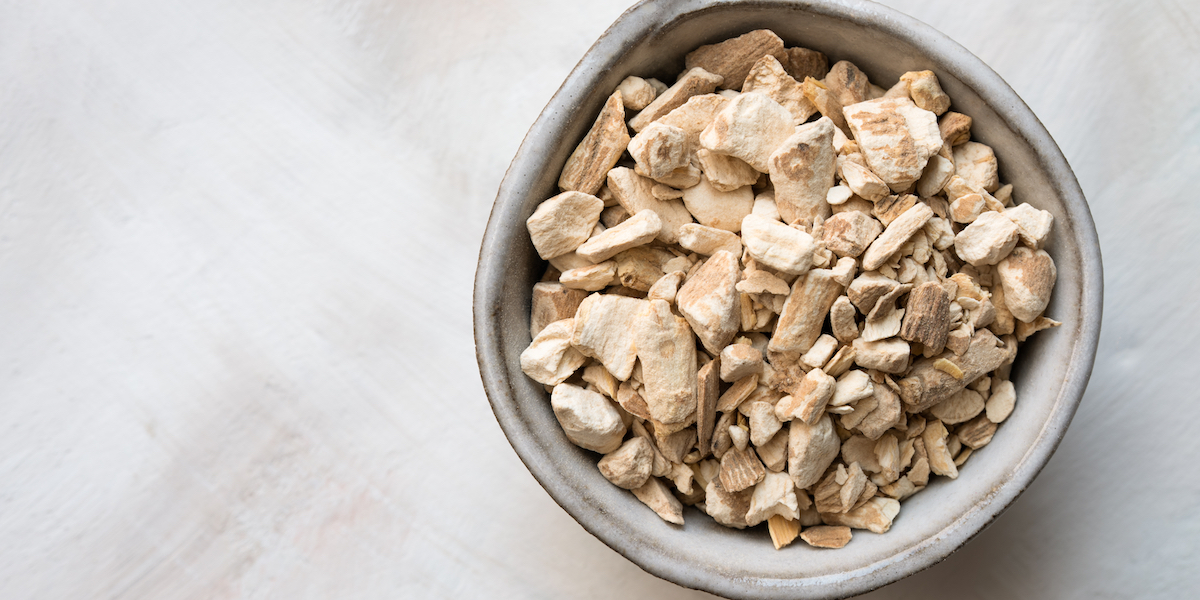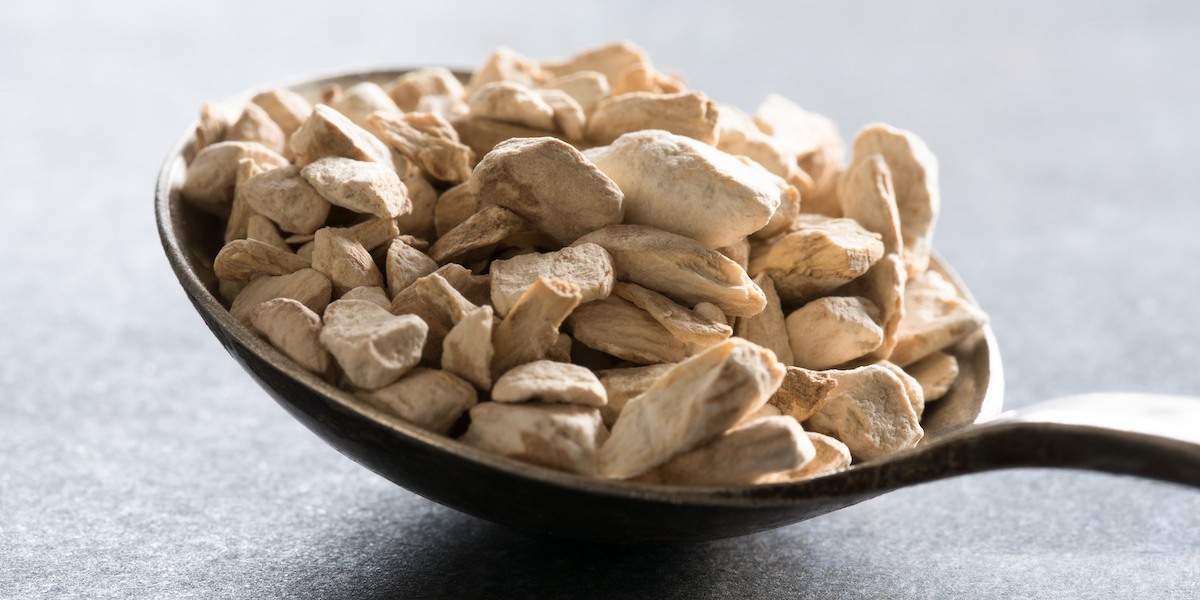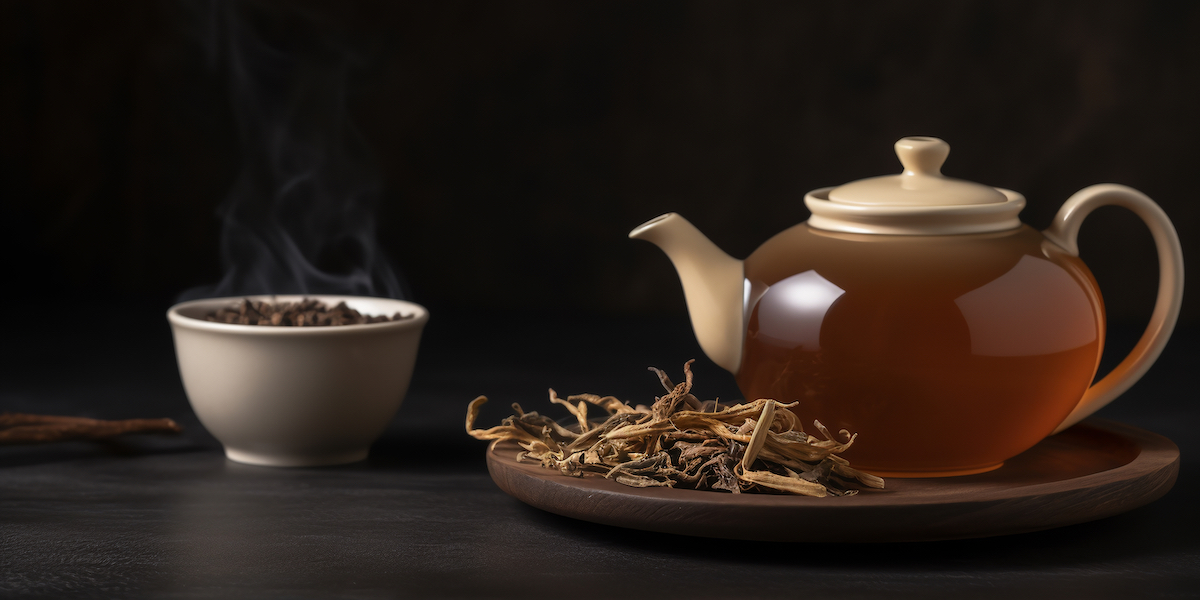Ashwagandha Tea Benefits & Side Effects

Estimated reading time: 11 minutes
Ashwagandha tea comes from the ancient Ayurvedic tradition. It has a reputation as a source of many health benefits. For centuries, people have used it for its well known Ashwagandha tea benefits. Its importance is huge. This potent brew offers a natural remedy for ailments such as anxiety and stress.
Recently, science has found that Ashwagandha is rich in powerful antioxidants. It also has anti-inflammatory agents. It also has calming properties.
These attributes work in harmony, mitigating stress and fostering an atmosphere of relaxation. Drinking Ashwagandha tea is a great way to get these benefits. It eliminates the need for pills. This herbal infusion has a delightful flavor. It turns your daily tea time into a health-boosting ritual. It lets you get the benefits of Ashwagandha tea.
Table of Contents
- Benefits of Ashwagandha Tea
- Ashwagandha Tea for Sleep
- Ashwagandha Can Increase Testosterone
- Ashwagandha Tea for Anxiety and Stress
- Ashwagandha Benefits Blood Sugar Levels
- Ashwagandha has Anti-Inflammatory Benefits
- Ashwagandha and Underactive Thyroid
- May Improve Endurance and Stamina
- Ashwagandha Tea Side Effects
- Conclusion

Benefits of Ashwagandha Tea
Ashwagandha tea, a gem from Ayurvedic tradition, is a repository of essential nutrients. A 100-gram serving of this ancient herb has 245 calories. They provide energy for your day. The serving also has 49.9 grams of carbs to fuel your body’s everyday functions.
It’s also a rich source of iron (3.3mg), calcium (23 mg), dietary fibre (32 gm), and a healthy dose of vitamin C (3.7 mg). These attributes make Ashwagandha tea an invaluable addition to any dietary regimen.
For over 3000 years, it has been effective. It is a staple in ayurvedic remedies. It started in ancient India and is now widespread in Pakistan and Sri Lanka. Ashwagandha tea has many benefits. They include easing stress, regulating hormones, reducing inflammation, and fostering stability.
The tea has a delightful, nutty flavor. This makes it ideal for a soothing cup of hot beverage. It also has medicinal value.

Ashwagandha Tea for Sleep
Ashwagandha Tea for Sleep
Sleep is vital to good health. It affects physical and mental strength. It functions as a restorative force, replenishing energy levels and harmonising hormonal balance. Furthermore, slumber benefits cognitive processes, enhancing focus and boosting memory retention.
Lack of sleep raises the risk of fatigue and infections. Chronic sleep deprivation can cause severe health problems. These include depression, heart disease, and type 2 diabetes. Ashwagandha tea has health benefits that may help with a better night’s sleep. It may offer a natural way to improve sleep quality and duration.
Ashwagandha tea is a natural way to improve your sleep. It makes sleep better. It reduces the need for sleeping pills or other chemical aids. It contains Ashwagandha extract. It is rich in constituents that interact with certain brain neurotransmitters. They promote tranquility and curb stress levels before sleep. This gentle, holistic approach supports your bedtime routine. It sets the stage for a peaceful night’s sleep each evening.
Early studies have shown that Ashwagandha can help improve sleep. It is a natural facilitator. Participants used this herbal supplement daily for six weeks. They noted a big improvement in sleep. On average, sleep quality and duration jumped by an impressive 72%. This gives hope to those seeking deeper, more restful sleep. It shows the health benefits of Ashwagandha tea. It can foster a good sleep cycle.

Ashwagandha Can Increase Testosterone
Testosterone is a vital hormone that plays a pivotal role in male health and development. Males produce it mostly in the testicles. It causes the growth of male secondary sexual traits.
These include the growth of facial and body hair. Also, the deepening of the voice comes during puberty. And, the development of muscle mass and strength. Testosterone causes these physical changes. It also affects sexual drive, bone density, and mental health in men.
Good health requires balancing the hormone. It boosts energy, stabilises mood, and aids thinking. As men age, testosterone levels naturally decline. This decline can cause mood changes. It can also lower sex drive, cause weight gain, and reduce muscle mass.
Yet, research suggests Ashwagandha tea has health benefits. It could help boost testosterone levels and counteract some age-related changes.
Ashwagandha has shown it raises levels of DHEA-S and testosterone. These are two critical sex hormones. Participants of the study saw a big boost in their DHEA-S levels. The levels rose by 18%. DHEA-S is a hormone linked with increased testosterone.
At the same time, their total testosterone levels rose by 14.7%. Researchers compared this to those given a placebo. These results underscore the potential Ashwagandha tea benefits in bolstering testosterone levels.

Ashwagandha Tea for Anxiety and Stress
Stress and anxiety can impact your well-being. They cause both mental and physical problems. Symptoms vary. They include disrupted sleep, headaches, fatigue, digestive issues, and muscle tension.
These symptoms impact daily life. They can also lead to worse health if left unchecked. Ashwagandha tea benefits offer a natural solution to these challenges. It is effective and holistic. It combats stress and its effects. Ashwagandha tea can relieve these symptoms. It promotes calm and better health.
Ashwagandha tea is rich in bioactive compounds like withanolides. It may help regulate the HPA axis, and so aid in stress management. Withanolides are the main active parts of Ashwagandha. We know that they interact with the HPA axis. This affects the secretion of cortisol, the body’s main stress hormone. By modulating cortisol levels.
Cortisol is a hormone crucial in the body’s stress response. The bioactive compounds in Ashwagandha can regulate it. Also, Ashwagandha can affect c-Jun N-terminal protein kinase. The cell responds to stress through this protein. Managing these key factors may make Ashwagandha tea holistic and helpful. It eases daily pressures and regulates stress.
In a recent study, 60 participants participated. Those who took a daily 240mg dose of Ashwagandha extract saw big drops in anxiety. They compared this to the placebo group. Additionally, the group had a 27% decrease in cortisol levels. They also had reduced inflammation markers. This study presents strong evidence. It shows the potential benefits of Ashwagandha tea. It can reduce anxiety and stress disorders.

Ashwagandha Benefits Blood Sugar Levels
Maintaining healthy blood sugar levels is essential for health and well-being. High blood sugar, or hyperglycaemia, can hurt the body’s organs. It also raises the risk of serious conditions like diabetes and heart disease. Ashwagandha tea may offer a natural solution to support blood sugar regulation.
Ashwagandha tea has many benefits. It can support a healthy balance of blood sugar. Through enhancing insulin sensitivity and curtailing insulin resistance. This helps the body metabolise glucose well. It avoids harmful spikes in blood sugar.
These traits may also help lower blood sugar. They do this by stimulating cells that take in glucose from the blood. Certain compounds are potent in this respect. They include withaferin A (WA).
Much research shows Ashwagandha can help blood sugar. It can also cut oxidative stress in people with diabetes. This includes 24 comprehensive studies. They include 5 clinical trials. The studies yielded impressive outcomes, such as improved HbA1c, insulin, lipids, and more.
The findings reflect the many benefits of Ashwagandha tea. It may help manage blood sugar. It sets it apart as a promising supplement for people looking to regulate their levels.

Ashwagandha has Anti-Inflammatory Benefits
Inflammation is the body’s immune system’s natural response to injury or irritation. It can be from physical or environmental causes. It manifests as redness, swelling, pain, and heat at the affected site. But, chronic inflammation can lead to long-term health problems. These include obesity, arthritis, and diabetes. Ashwagandha is a renowned medicinal herb. It comes into play with its strong anti-inflammatory properties.
Ashwagandha has many valuable compounds. For example, it has Withaferin A (WA). Researchers have studied this compound to explore its potential in reducing body inflammation. Research has shown that WA can target two pathways. They are NF-κB and Nrf2. This forms an effective combo to fight inflammation.
In a 2008 study, adults took Ashwagandha extract. It reduced stress-related inflammation. After two months, they saw big decreases in C-reactive protein. This protein indicates inflammation. We compared the decreases to the placebo group.
This evidence shows the benefits of adding Ashwagandha tea to a daily routine. It helps manage inflammation. It may be a valuable option. It is for those seeking to reduce chronic inflammation and boost well-being.

Ashwagandha and Underactive Thyroid
A good thyroid is crucial. It upholds routine metabolic activities, including making energy, and growth. Hypothyroidism is an underactive thyroid. It can cause symptoms such as lethargy and weight gain. It can also cause many other health problems.
Studies on Ashwagandha tea benefits show it may boost the thyroid. In a study of 60 subjects with hypothyroidism, Ashwagandha supplements improved their conditions. After two months, the levels of T3 and T4 surged. These hormones are vital for a healthy thyroid.
The Journal of Ayurveda and Integrative Medicine published another recent study. It explored the health benefits of Ashwagandha tea. It studied its effects on the thinking of people with bipolar disorder. Over eight weeks, researchers saw a surprise. T4 hormone levels rose in many participants. This was not the main goal of the study.
These findings are intriguing. But, we need more research. It will let us make firm conclusions. It’s about Ashwagandha’s benefits for people with bipolar disorder.
It’s important to note that Ashwagandha tea may not be suitable for everyone. Evidence suggests people with hyperactive thyroid conditions. Like Graves’ disease, you may need to avoid Ashwagandha tea. It can stimulate more production of T4 hormones.
Like any supplement or herbal therapy, consult a healthcare provider before using Ashwagandha. This ensures its safe and beneficial use.

May Improve Endurance and Stamina
Do you want to improve your fitness and energy? If so, Ashwagandha tea could help. As a potent adaptogen, Ashwagandha combats fatigue and augments physical performance.
It has a unique ability to improve thinking. It might reduce pain and lower stress hormones. This boosts focus and motivation. This leaves individuals feeling revitalised, without jeopardising health or wellness.
In 2015, a key study in India assessed Ashwagandha extracts. It looked at their impact on the endurance of 50 seasoned athletes. The results were promising. No one reported any bad events during the trial, where people were given a placebo. This leads to the conclusion that this herb could boost physical performance.
Another study also found this. The Journal of Ayurveda and Integrative Medicine published it. It found that Ashwagandha may help in muscle recovery and repair. The study involved 57 individuals with a history of physical training. They saw big improvements in their strength. This happened after eight weeks of taking Ashwagandha every day.
The findings suggest drinking Ashwagandha tea could boost your endurance and stamina. Adding it to your routine could help. This has made it a popular supplement among athletes and fitness enthusiasts. It is also popular among those seeking natural ways to boost their energy.

Ashwagandha Tea Side Effects
Ashwagandha tea is safe and well-tolerated. But, it has potential side effects. Some individuals may experience mild discomforts, such as nausea, facial flushing, or headaches. Additionally, interactions may occur between Ashwagandha tea and certain medications or supplements.
So, you must ask a healthcare provider before adding this herbal tea to your routine. It’s also vital to note that pregnant or nursing people should avoid Ashwagandha tea. There is no safety data for them.
Furthermore, those on thyroid medications should be cautious. We know that Ashwagandha influences T4 production. Also, it may interfere with medications used to treat high or low blood pressure. It is crucial for those living with chronic health conditions to consult a healthcare provider before drinking it.

Conclusion
Ashwagandha tea is also called “Indian ginseng.” Ayurvedic medicine has used it for centuries. It is gaining popularity in the Western world due to its potential health benefits. It may reduce inflammation. It may also improve thinking. This herbal tea may offer many benefits for well-being.
Yet, we need to note that more research is important. We need it to understand Ashwagandha tea’s effects on health conditions. Before adding it to your routine, ask a healthcare provider to ensure it’s safe and right. With proper guidance and use, Ashwagandha tea may help promote a healthier lifestyle.
So why not give it a try? You may discover its potential benefits for yourself. So, continue enjoying Ashwagandha tea and its many benefits!

 Loose Leaf Tea
Loose Leaf Tea Pyramids
Pyramids Tea Bags
Tea Bags Africa
Africa Assam
Assam Ceylon
Ceylon Chinese
Chinese Darjeeling
Darjeeling European
European Indian
Indian Japan
Japan Nepal
Nepal South East Asia
South East Asia Ayurveda Tea
Ayurveda Tea Black Tea
Black Tea Chai Tea
Chai Tea Flowering Tea
Flowering Tea Fruit Tisanes
Fruit Tisanes Green Tea
Green Tea Herbal Tea
Herbal Tea Matcha Tea
Matcha Tea Oolong Tea
Oolong Tea Organic Tea
Organic Tea Pu erh Tea
Pu erh Tea Rooibos Tea
Rooibos Tea White Tea
White Tea Asian Coffee
Asian Coffee Caribbean Coffee
Caribbean Coffee Central American Coffee
Central American Coffee South American Coffee
South American Coffee Coffee Blends
Coffee Blends Decaffeinated Coffee
Decaffeinated Coffee Espresso Coffee
Espresso Coffee Ethically Sourced Coffee
Ethically Sourced Coffee Flavoured Coffee
Flavoured Coffee Organic Coffee
Organic Coffee Single Origin Coffee
Single Origin Coffee Chocolate 1
Chocolate 1 Chocolate 2
Chocolate 2 Chocolate 3
Chocolate 3 Chocolate 4
Chocolate 4 Chocolate 5
Chocolate 5 Chocolate 6
Chocolate 6 Chocolate 7
Chocolate 7 Chocolate 8
Chocolate 8 Chocolate 9
Chocolate 9 Loose Tea Filters
Loose Tea Filters Tea Accessories
Tea Accessories Tea Bricks
Tea Bricks Tea Caddies
Tea Caddies Tea Caddy Spoons
Tea Caddy Spoons Tea Gift Ideas
Tea Gift Ideas Tea Infusers
Tea Infusers Tea Strainers
Tea Strainers